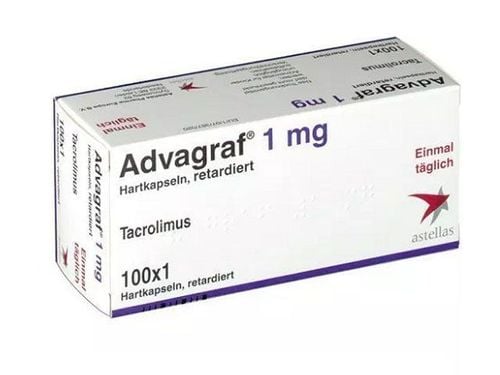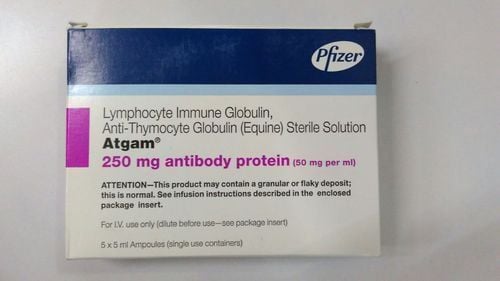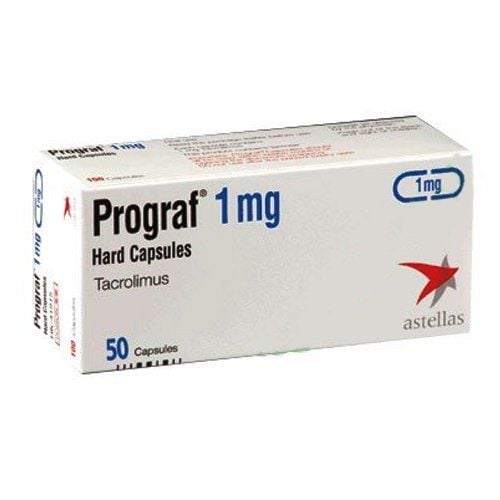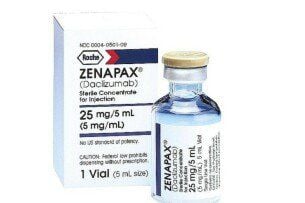This is an automatically translated article.
Antithymocyte globulin belongs to the group of selective immunosuppressants. Antithymocyte globulin is indicated for the prevention of transplant rejection, delaying the first stage of rejection in patients who have undergone a kidney transplant.
1. Mechanism of action of the drug Antithymocyte globulin
Antithymocyte globulin - purified, sterilized gamma globulin and obtained after immunostaining of rabbits with human thymocytes. The expression of T lymphocyte markers in Jurkat cells corresponds to the effect of Antithymocyte globulin on T lymphocytes. And Antithymocyte globulin contains antibodies against the cell surface antigen Jurrkat.
Antithymocyte globulin reduces the lymphocyte subset that transports surface proteins expressed by the Jurkat cell line.
Antithymocyte globulin does not activate T lymphocytes through CD3 but inhibits T cell activity by anti-CD3 antibodies. Antithymocyte globulin helps to reduce malignant metastasis by binding to the adhesion molecule. It is also because of the anti-adhesion properties due to anti-LFA1 and anti-ICAM1 activities that may explain why Antithymocyte globulin reduces renal vascular resistance, and at the same time reduces the retention of lymphocytes in the kidney when the kidney is perfused.
2. Indications and contraindications Antithymocyte globulin
Antithymocyte globulin is indicated to help prevent and treat kidney transplant rejection. The drug can also be used in the prevention of chronic host disease, heart transplant rejection, intestinal and multi-organ rejection such as stomach, duodenum, pancreas, small intestine, liver, lung transplant rejection. . In addition, Antithymocyte globulin is indicated in the treatment of moderate to severe aplastic anemia in patients unsuitable for bone marrow transplantation. However, Antithymocyte globulin is also contraindicated in patients with hypersensitivity to the components of the drug, or in patients with uncontrolled bacterial, viral, or parasitic infections. Or organ transplant patients with severe thrombocytopenia due to Antithymocyte globulin, which can aggravate thrombocytopenia and increase the risk of bleeding, patients with malignancies.
3. Dosage and how to use Antithymocyte globulin
What is antithymocyte globulin? Antithymocyte globulin recommended for kidney transplant patients should be diluted before use in 0.9% NaCl, 5% Destrose and 0.225% NaCl or 0.45% NaCl and 5% Dextrose. However, the concentration did not exceed 4 mg of Antithymocyte globulin. When diluting the ene solution, shake gently to mix the solution.
Antithymocyte globulin is infused intravenously, and must be performed in a medical facility that meets the requirements. The patient should be closely monitored during the infusion process.
Before conducting the infusion, the patient will be assigned to do a skin test to identify and monitor skin reactions.
During the infusion, if the patient feels unusual signs of allergies or side effects, they should immediately notify the medical staff for timely support.
4. Unexpected side effects when using Antithymocyte globulin
Allergic reactions may include anaphylaxis. Therefore, patients should be monitored for fever, chills, itching, swelling, rash, shortness of breath, low blood pressure, nausea and vomiting Unexplained fever Headache High lipid content Potassium content High Urinary tract infection Infection and decreased white blood cell count cause neutropenia when using Tivdak. White blood cells play an important role in the body's fight against infections. When treated with Tivdak medicine, it can reduce the number of white blood cells, especially white blood cells, which increases the risk of infection in the patient's body. Patients may experience symptoms such as fever over 38 degrees Celsius, colds, sore throat, shortness of breath, burning when urinating and pain states that do not go away... When the patient experiences the above signs should immediately notify the treating doctor for examination and medical assistance promptly. Antithymocyte globulin is made from blood products, so there is a small risk that the medicine will be contaminated with infectious agents. However, the manufacturing process prevents these disadvantages. Accordingly, patients should avoid receiving live vaccines while using Antithymocyte globulin, because they may not work, such as vaccines for shingles, polio, influenza, rotavirus...
Follow the disease website Vinmec International General Hospital to get more information about health, nutrition, beauty to protect the health of yourself and your loved ones in your family.
Please dial HOTLINE for more information or register for an appointment HERE. Download MyVinmec app to make appointments faster and to manage your bookings easily.
Reference source: oncolink.org













